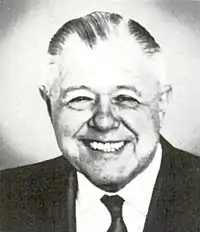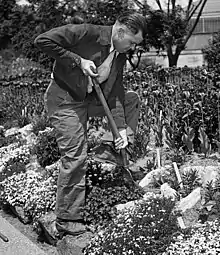William Robert Poage | |
|---|---|
 | |
| Member of the U.S. House of Representatives from Texas's 11th district | |
| In office January 3, 1937 – December 31, 1978 | |
| Preceded by | Oliver H. Cross |
| Succeeded by | Marvin Leath |
| Chairman of the House Committee on Agriculture | |
| In office January 3, 1967 – January 3, 1975 | |
| Preceded by | Harold D. Cooley |
| Succeeded by | Thomas S. Foley |
| Member of the Texas State Senate from the 13th district | |
| In office January 13, 1931 – January 12, 1937 | |
| Preceded by | I. D. Fairchild |
| Succeeded by | William R. Newton, Sr. |
| Member of the Texas House of Representatives from the 2nd district | |
| In office January 13, 1925 – January 8, 1929 | |
| Preceded by | Tom Shires |
| Succeeded by | Frank Baldwin |
| Personal details | |
| Born | William Robert Poage December 28, 1899 Waco, Texas, U.S. |
| Died | January 3, 1987 (aged 87) Temple, Texas, U.S. |
| Political party | Democratic |
| Spouse | Frances Cotton |
| Alma mater | Baylor University (AB, LLB) |
William Robert Poage (December 28, 1899 – January 3, 1987) was a Texas politician who won election to the United States House of Representatives 21 times, serving 41 years.
Early life and education
William Robert "Bob" Poage was born in Waco, Texas to William Allen and Helen Wheeler (Née Conger) and was raised near Woodson. He attended the schools of Throckmorton County, and during World War I served as an apprentice seaman in the United States Navy. He attended the University of Texas at Austin and the University of Colorado Boulder before receiving a Bachelor of Arts degree from Baylor University in 1921. He farmed and taught geology at Baylor before attending Baylor Law School, from which he received his LL.B. in 1924. Poage practiced law in Waco and taught at Baylor Law.
Political career
A Democrat, he served in the Texas House of Representatives from 1925 to 1929, and the Texas State Senate from 1931 to 1937.

In 1936, Poage was elected to the House of Representatives. He was later diagnosed with Ménière's disease, which eventually left him deaf in one ear. In the House, he supported acts designed to help the rural residents of his district. He supported the farm price supports of the Roosevelt Administration, and worked to keep farmers prosperous.[1] Poage was the chairman of the Committee on Agriculture from 1967 to 1975, until he was removed from his position in a revolt by House Democratic Caucus against the Seniority system. The Caucus considered Poage to be too conservative and he was replaced by Tom Foley (D-WA), a future Speaker of the House.
He was one of the majority of the Texan delegation to decline to sign the 1956 Southern Manifesto[2] opposing the desegregation of public schools ordered by the Supreme Court in Brown v. Board of Education. However, Poage voted against the Civil Rights Acts of 1957,[3] 1960,[4] 1964,[5] and 1968,[6] as well as the 24th Amendment to the U.S. Constitution and the Voting Rights Act of 1965.[7][8][9] And, when lobbied by the Johnson administration to support the War on Poverty legislation for the opportunities and services it would provide, Poage responded, "Oh, I see! You're talking' about the niggers!" [10]
Retirement and death
Poage did not run for re-election in 1978 and retired on December 31, 1978, 4 days before the official end of his 21st term in office. He returned to his home in Waco, Texas. The following year the W. R. Poage Legislative Library for Graduate Studies and Research was dedicated on the Baylor University Campus to house Poage's congressional papers and the papers of eight other former U. S. Congressmen.[11] On January 3, 1987, he died of heart failure at 87 years old after receiving open heart surgery.[12]
References
- ↑ Pearson, R. (1987, January 4). Former U.S. Rep William R. (Bob) Poage Dies. Washington Post. Retrieved December 2, 2016.
- ↑ "Southern Manifesto" (PDF). Congressional Record - Senate: 4459–4461.
- ↑ "HR 6127. CIVIL RIGHTS ACT OF 1957". GovTrack.us.
- ↑ "HR 8601. PASSAGE".
- ↑ "H.R. 7152. PASSAGE".
- ↑ "TO PASS H.R. 2516, A BILL TO ESTABLISH PENALTIES FOR INTERFERENCE WITH CIVIL RIGHTS. INTERFERENCE WITH A PERSON ENGAGED IN ONE OF THE 8 ACTIVITIES PROTECTED UNDER THIS BILL MUST BE RACIALLY MOTIVATED TO INCUR THE BILL'S PENALTIES".
- ↑ "S.J. RES. 29. CONSTITUTIONAL AMENDMENT TO BAN THE USE OF POLL TAX AS A REQUIREMENT FOR VOTING IN FEDERAL ELECTIONS". GovTrack.us.
- ↑ "TO AGREE TO CONFERENCE REPORT ON S. 1564, THE VOTING RIGHTS ACT".
- ↑ "TO PASS H.R. 6400, THE 1965 VOTING RIGHTS ACT".
- ↑ Lemann, Nicholas. (1991). The Promised Land: The Great Black Migration and How It Changed America (1st ed.). New York: A.A. Knopf. p. 156. ISBN 0-394-56004-3. OCLC 22240548.
- ↑ "W. R. "Bob" Poage Biography". Archived from the original on August 28, 2003. Retrieved 2007-03-17.
{{cite web}}: CS1 maint: bot: original URL status unknown (link) - ↑ Saxon, W. (1987, January 4). Ex Congressman W.R. Poage, 87; Texan Headed Agriculture Panel. New York Times. Retrieved December 2, 2016.
External links
- United States Congress. "William R. Poage (id: P000398)". Biographical Directory of the United States Congress.
- William Robert Poage from the Handbook of Texas Online
- Baylor Collection of Political Materials (BCPM) web site at the Wayback Machine (archived April 16, 2003)
- William R. Poage at Find a Grave WR Poage at Oakwood Cemetery (Waco, Texas)
